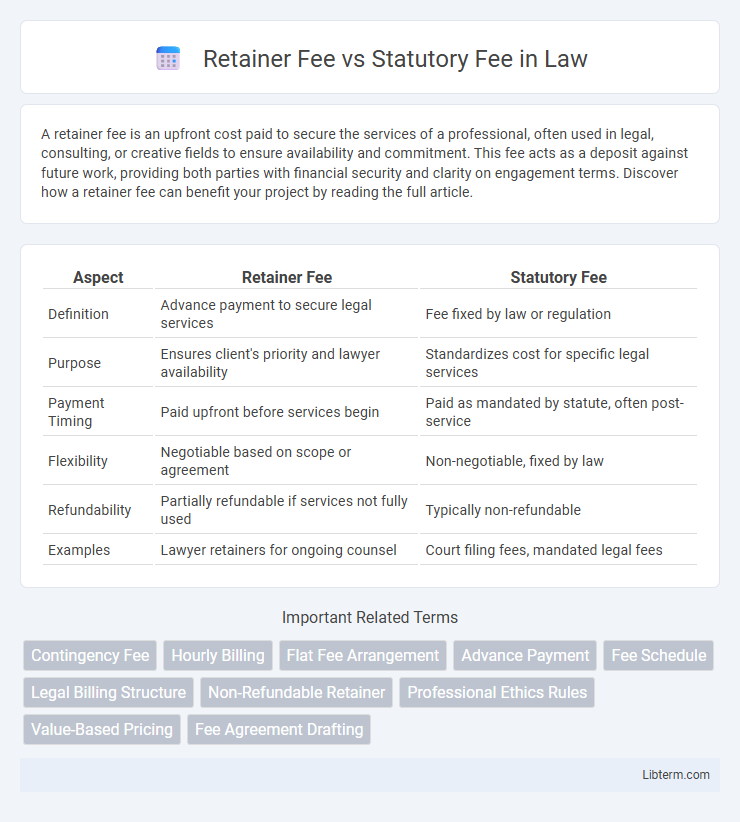A retainer fee is an upfront cost paid to secure the services of a professional, often used in legal, consulting, or creative fields to ensure availability and commitment. This fee acts as a deposit against future work, providing both parties with financial security and clarity on engagement terms. Discover how a retainer fee can benefit your project by reading the full article.
Table of Comparison
| Aspect | Retainer Fee | Statutory Fee |
|---|---|---|
| Definition | Advance payment to secure legal services | Fee fixed by law or regulation |
| Purpose | Ensures client's priority and lawyer availability | Standardizes cost for specific legal services |
| Payment Timing | Paid upfront before services begin | Paid as mandated by statute, often post-service |
| Flexibility | Negotiable based on scope or agreement | Non-negotiable, fixed by law |
| Refundability | Partially refundable if services not fully used | Typically non-refundable |
| Examples | Lawyer retainers for ongoing counsel | Court filing fees, mandated legal fees |
Understanding Retainer Fees: Definition and Purpose
Retainer fees are upfront payments made to secure the services of a professional, ensuring their availability and prioritizing client work. These fees are distinct from statutory fees, which are fixed charges mandated by law for specific services or filings. Understanding retainer fees involves recognizing their role in fostering ongoing client-professional relationships and covering initial consultation or preparatory work.
What Are Statutory Fees? Key Characteristics
Statutory fees are fixed charges mandated by law for specific services or transactions, such as court filing fees or government processing charges. They have defined amounts established through legislation or regulatory authority, ensuring consistency and transparency in their application. These fees are non-negotiable and must be paid to comply with legal or administrative requirements in various sectors, including legal, real estate, and licensing processes.
How Retainer Fees Work in Practice
Retainer fees function as upfront payments made to secure legal services, ensuring the attorney's availability and covering initial work before billing hourly or flat fees. These fees act as a financial commitment from the client and are often deposited into a trust account, from which the attorney deducts expenses or hourly charges as the case progresses. Unlike statutory fees, which are fixed by law for specific services, retainer fees offer flexibility based on the scope and duration of the legal engagement.
Statutory Fees: Legal Framework and Examples
Statutory fees are fixed charges mandated by law or government regulations, ensuring transparency and standardization across various professional and administrative services. Examples of statutory fees include court filing fees, notary public fees, and licensing charges, which are established under specific legal frameworks such as the Judiciary Act or local government ordinances. These fees differ from retainer fees, which are negotiated payments made upfront to secure professional services, typically in legal or consulting contexts.
Key Differences Between Retainer and Statutory Fees
Retainer fees are advance payments made to secure ongoing legal services, often credited against future work, while statutory fees are fixed charges mandated by law or regulations for specific legal processes. Retainer fees offer flexibility in service scope and usage, whereas statutory fees are non-negotiable and predetermined by governing authorities. Understanding these key differences helps clients budget accurately and ensures compliance with legal fee structures.
Pros and Cons of Retainer Fees
Retainer fees offer clients consistent access to legal services and help lawyers manage cash flow, but they require upfront payment that may not be fully utilized if legal needs are minimal. Unlike statutory fees, which are fixed and regulated by law, retainer fees provide flexibility but can lead to disputes over unused portions or scope of work. Clients benefit from priority service, while lawyers secure financial stability, yet both must clearly define terms to avoid misunderstandings.
Advantages and Disadvantages of Statutory Fees
Statutory fees offer transparency and consistency, as they are fixed by law and avoid unexpected costs, providing clients with clear financial expectations. However, statutory fees may lack flexibility, potentially resulting in clients paying for services that exceed their specific needs or receiving less tailored attention. This rigidity can limit negotiation opportunities and may not reflect the complexity or scope of individual cases.
Situations Where Retainer Fees Are Commonly Used
Retainer fees are commonly used in legal, consulting, and freelance services where clients require ongoing access to expertise or priority support, ensuring availability and securing dedicated time from professionals. These fees are typically paid in advance and cover a range of services over a specified period, allowing for flexible work scope without the need for individual contracts for each task. Statutory fees, in contrast, are fixed charges mandated by law for specific services or filings, lacking the flexibility and ongoing nature of retainer arrangements.
When Are Statutory Fees Applied?
Statutory fees are applied when government-mandated charges are required for specific legal, administrative, or regulatory services, such as filing patents, trademarks, or licensing applications. These fees are fixed by law and must be paid to the relevant authorities regardless of any private agreements or services. Unlike retainer fees, statutory fees are non-negotiable and are essential for processing official documentation or compliance tasks.
Choosing Between Retainer Fee and Statutory Fee: Which Is Right for You?
Choosing between a retainer fee and a statutory fee depends on the scope and predictability of legal services required. Retainer fees offer upfront payment for ongoing access to legal counsel, ideal for clients seeking continuous support and flexibility. Statutory fees, fixed by law or regulation, suit those needing specific services with transparent, regulated costs.
Retainer Fee Infographic

 libterm.com
libterm.com